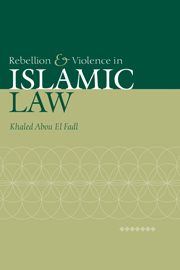Book contents
- Frontmatter
- Contents
- Preface and acknowledgments
- Introduction
- 1 Modern scholarship and reorienting the approach to rebellion
- 2 The doctrinal foundations of the laws of rebellion
- 3 The historical context and the creative response
- 4 The rise of the juristic discourse on rebellion: fragmentation
- 5 The spread of the Islamic law of rebellion from the fourth/tenth to the fifth/eleventh centuries
- 6 Rebellion, insurgency, and brigandage: the developed positions and the emergence of trends
- 7 The developed non-Sunnī positions
- 8 Negotiating rebellion in Islamic law
- Works cited
- Index of names
- Index of subjects
2 - The doctrinal foundations of the laws of rebellion
Published online by Cambridge University Press: 15 December 2009
- Frontmatter
- Contents
- Preface and acknowledgments
- Introduction
- 1 Modern scholarship and reorienting the approach to rebellion
- 2 The doctrinal foundations of the laws of rebellion
- 3 The historical context and the creative response
- 4 The rise of the juristic discourse on rebellion: fragmentation
- 5 The spread of the Islamic law of rebellion from the fourth/tenth to the fifth/eleventh centuries
- 6 Rebellion, insurgency, and brigandage: the developed positions and the emergence of trends
- 7 The developed non-Sunnī positions
- 8 Negotiating rebellion in Islamic law
- Works cited
- Index of names
- Index of subjects
Summary
THE ORIGINS OF THE DISCOURSE
According to Muslim jurists, other than fighting the unbelievers, there are three types of combat (qitāl): (1) fighting apostates (murtaddūn); (2) fighting brigands (muḥāribūn); and (3) fighting rebels (bughāh). Apostates may be killed unless they repent, and brigands and highway robbers may be killed, crucified, have a hand and foot amputated, or banished; however, rebels may not be killed, tortured, or imprisoned. Apostasy and brigandage are very serious crimes and are punished harshly. Insurrection or rebellion is not a crime and is treated leniently. A bāghī (rebel) may not be executed, crucified, or tortured. In Islamic discourses, the word for brigandage is muḥāraba, which means to contest, to disobey, or to fight. By itself, the word is value-neutral; it does not necessarily connote something illegal or immoral. The word for rebellion is baghy and, as noted earlier, it means to demand or to exceed the limits or to commit injustice. The word is not value-neutral, yet Muslim sources consistently state that the term, in law, does not connote censure or blame (laysa bi ismi dhamm). However, certain jurists insist that baghy is an offense that results in the greatest corruption (acẓamu al-jināyāti mafsadatan) because it results in the destruction of life and property. Furthermore, several jurists assert that the law of rebellion, in particular, is so significant that the sole reason the Companions of the Prophet fought each other is so that they would teach Muslims aḥkām al-bughāh.
- Type
- Chapter
- Information
- Rebellion and Violence in Islamic Law , pp. 32 - 61Publisher: Cambridge University PressPrint publication year: 2001

